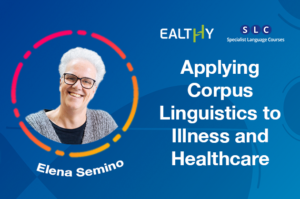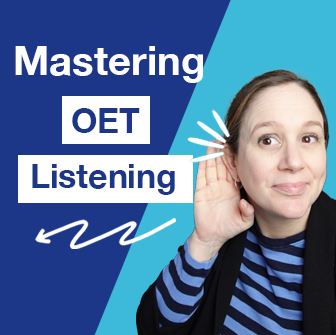
What do you get if you analyse tens of millions of words written about healthcare?
If you’re at all interested in how language works in healthcare, you’d be nuts to miss the upcoming webinar from SLC and EALTHY.

The OET Listening test is one of the most challenging parts of the exam. Healthcare professionals must understand consultations, workplace conversations, and medical presentations—all in real-time with only one chance to listen.
This can be overwhelming, especially with varied accents, medical terminology, and paraphrased speech. However, with the right strategies and practice, you can improve your comprehension and confidently answer questions.
In this guide, we’ll break down:
✔ What happens in each section of the OET Listening exam
✔ The common challenges candidates face
✔ Proven strategies to improve your listening skills
✔ Practical resources to help you prepare
✔ A free OET Listening handout to boost your exam performance
The OET Listening exam is divided into three parts:
Each section tests different skills, and you’ll only hear the audio once, making effective strategies essential for success.
Many candidates struggle with OET Listening because of:
✔ Limited time to read the questions before the audio starts
✔ Patient speech variations in Listening A
✔ Paraphrasing throughout all sections
✔ Maintaining focus while listening
✔ Identifying attitudes and opinions in Listening C
✔ Distractors in answer choices that can mislead you
To overcome these challenges, you need to develop strong listening skills and practice with a variety of resources.
To perform well in the OET Listening test, practice with real-life healthcare conversations and presentations:
✅ For Listening A (Medical Consultations):
✅ For Listening C (Presentations & Talks):
These resources will help you get used to different accents, speech speeds, and medical terminology used in OET.
✔ Identify the main issue the patient is discussing
✔ Listen for key medical terms and paraphrased information
✔ Follow the flow of the consultation – symptoms, diagnosis, treatment
✔ Listen for specific details – instructions, requests, and professional interactions
✔ Focus on understanding the speaker’s role and what they expect from the listener
✔ Use pre-listening time wisely – underline keywords in the questions
✔ Identify the speaker’s opinion or attitude
✔ Be aware of distractors in the answer options
Specialist Language Courses (SLC) are dedicated to helping healthcare professionals excel in the OET. Our expert-led courses focus on the specific language skills and test strategies needed to succeed. With personalised coaching, practice tests, and targeted exercises, we ensure you build the confidence and competence required for each OET sub-test. Join SLC to boost your chances of achieving the scores you need and advancing your healthcare career
Get a FREE OET Listening Strategy Guide with essential tips and sample questions.
Learn how to apply these strategies with expert guidance. Watch now and boost your OET Listening score!
Mastering OET Listening takes practice, but with the right approach, you can confidently tackle the test and achieve your target score. Keep practicing, stay focused, and use the best resources to succeed!

If you’re at all interested in how language works in healthcare, you’d be nuts to miss the upcoming webinar from SLC and EALTHY.

Back to Menu ↩ Vocational ESOL focuses on the language that migrants and refugees need when working in the UK. Different sectors require different language

At Specialist Language Courses, your progress doesn’t stop when your subscription ends. All Reach OET B Medicine, Reach OET B Nursing and all professions subscribers automatically
Get updates and get the latest materials on Medical English, OET and IELTS
